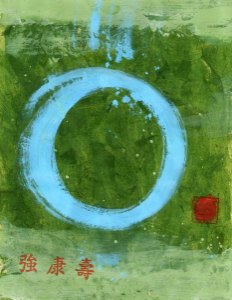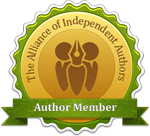Write Like a Warrior
When heading into a fight a true warrior is relaxed and flexible, just as you need to be flexible in your approach to writing and creativity. If you enter the creative process filled with tension, lacking in confidence, or with creative anxiety, fear and doubt that fear can translate onto the page, leading your writing to also feel a little tense or stiff.
A warrior doesn’t force but yields, using the strength of the opponent against them, which not only conserves their own energy but also increases their own power and ability to succeed. “The greatest warriors tell us that they approach war as an art — they’re flexible, receptive, smart. The ultimate warrior brings a sense of liveliness and joy to the battle, and fearless immediacy,” says author and contributing editor of Writer’s Digest, Elizabeth Sims.
Conversely, if entering a fight filled with fear and trepidation that fear will hinder both pleasure and skill. “He’ll be tight and ridged, both mentally and physically. He might survive, but he has a better chance of decisively winning if he can relinquish fear and rigidity, and bring a flexible plan to the fight.”
Be like the warrior and be loose in your writing and creative offerings. Readers can tell if you are resisting the process, if your words are forced or stuck, and caught instead of flowing onto the page. So you don’t overthink it, and not overthinking is key. Relax into the creative process, yield as necessary but remain as strong and flexible as bamboo.
Tap the keys gently, write with your heart open, body lose and your mind free, soften your face and slow the tempo of your breath. “The creative process is a process of surrender, not control,” says author and artist, Julia Cameron. “Writing, and this is the big secret, wants to be written.”
Ignore Your Monkey Mind [and Create]
It’s hard to create anything if your thinking is scattered and you distracted. According to teachings of the East, the ‘monkey mind’ is a Buddhist concept that refers to the inner voice that keeps talking in our forebrains, refusing to silence its doubts, fears, anxieties, or simply keeps drawing us from the present moment and pulling our thoughts in different directions, keeping our thinking unsettled, distracted, and busy. In turn, hampering both creativity and process.
“We all have tremendously strong monkey minds that are very creative, that can make endless excuses. It keeps us away from our true hearts, from expressing our real thoughts,” says author Natalie Goldberg. “[It] tells us things such as ‘I can’t write today’. ‘I can’t write today because my daughter is having trouble in school. I really can’t write because I have a stomach ache.’ The monkey mind will always think of new reasons why we can’t write. What I teach is if you want to write, do it and do it now.”
The term comes from when Buddha described the human mind as being filled with drunken monkeys, jumping, screeching, and endlessly clamouring for your attention. The simplest way to stop those metaphorical monkeys from leaping from tree to tree is to simply pause and become aware of your breath for a few moments before you create.
Slow down its tempo and attend to any tension in your body, and sit in stillness. As thoughts appear, allow them to pass like leaves in a stream or clouds in a clear, blue sky, with you unaffected by their presence. “You must try to ignore your monkey mind and in order to write,” says Natalie Goldberg.
Quiet Your Mind Before Creativity

If you are feeling overwhelmed, stressed or your focus scattered by those errant monkeys, and to help facilitate this process, pressing lightly with your thumb at the back of the skull in the centre causes the relevant brain channel to relax. “Fear is an especially loud monkey, sounding the alarm incessantly, pointing out all the things we should be wary of and everything that could go wrong,” says sociologist and author, BJ Gallagher.
The acupressure points Gall Bladder 20 (GB 20) or the Gates of Consciousness points (see image) — in the hollows about two to three inches apart directly beneath the skull — along with the Heavenly Pillar or Bladder 10 (B 10) points — found one-half inch below the base of the skull on the ropy muscles one-half inch outward from the spine — can quieten the busyness of your mind, ease feelings of overwhelm and unclear or muddled thinking.
Pressing them also helps your neck relax allowing greater circulation into your brain, which in turn increases your ability to memorise and focus on your work, creative or otherwise. You may also find these psychology techniques useful if internal chatter is inhibiting your creativity and flow.
This Acupressure Sequence is ideal for affording you a moment of calm and serene stillness in a busy day. The finest way to still your mind is through a consistent meditation practice but even taking time out for just the briefest of moments can help calm your mind and still your centre, enabling you to write and make your art with far more ease.
Humility and the Blank Canvas
There’s the idea in Taoism that you approach the blank page/canvas/screen/soundscape, with humility and respect and let it fill itself, with you merely following and allowing, with gratitude and humility at the opportunity to create. In the same way, you are the creative conduit who does not conjure up fine creative offerings but instead is open, receptive to put them down whether on the page/canvas/screen/soundscape and so on.
“It’s the Tao that creates everything – the a priori generative force – align yourself with that and what you’re creating will in fact create itself,” says healer, author, music-maker and master and teacher of the Taoist arts, Stephen Russell aka Barefoot Doctor. “Don’t push it – invite it. Once you feel it coming, let it percolate and don’t try to pour it out too fast, before it’s ready to flow freely.”
Another teaching from the East that helps quieten the busyness in our minds is to allow your consciousness to drop back to what the ancient Taoists referred to as the cave of the original spirit, wherein you soon find yourself free to create, undistracted by those monkeys.
Start by emptying yourself. This is a simple matter of relaxing you whole body, attending to any tension and allowing your thoughts to drift, without you engaging with them. It can help to think of those thoughts as leaves on a stream, gently floating by and you aware of them but merely the observer.
“Collect your consciousness in your central brain region, focusing instead on your breathing and letting that be intrinsic to your experience,” says Stephen Russell. “After a few minutes of stillness, during which some space will have had time to appear between the clouds in the sky of your mind, you will start to become aware of a presence – it will be subtle, yet, if you can remain still enough to feel it, profound, nonetheless. This, for want of a better expression, is your muse.”
Dedication [Even Through the Hard Days]
Like the dedicated warrior who trains everyday, you also must be willing to learn and evolve in your craft and skill without being perturbed by those less than lovely creative days where things do not go to plan, or if projects fail. “Celebrate falling down as well as getting up: it’s all part of learning,” says Mary Jaksch. Pixar filmmaker, Andrew Stanton also believes that failure is a fundamental part of learning and in applying that mindset to everything you attempt, you can relinquish the need to exclusively succeed.
“You wouldn’t say to somebody who is first learning to play the guitar, ‘You better think really hard about where you put your fingers on the guitar neck before you strum, because you only get to strum once, and that’s it. And if you get that wrong, we’re going to move on.’ That’s no way to learn, is it?” He says. You may enjoy this Ted Talk with Andrew Stauton: Clues to a Great Story.
In much the same way, if you are exclusively striving to be good, to produce work that is not only of a high quality but instantly of that quality, then you are setting yourself up for a different kind of failure. Trying to be good and trying to be creative are very different processes. “A disappointment can sting, a sluggish day can put you into a funk, but you’ll shrug it off quickly if you keep this in mind: If you can talk, you can write, and if you can write, you can tell the stories you were born to share,” says Elizabeth Sims.
Childlike Wonder and Playfulness
The many benefits of living your life with childlike wonder have long been known and taught in the East. The ancient Taoists were especially fond of maintaining the wonder of children, being open to each experience and embracing all that comes with that openness, trust and playful wonder of a child.
Much like the ancient Taoists, always seeing the lighter, brighter side of life, the wonder, and the more humorous and playful side — no matter what you are creating — is key no matter the medium of your creative expression. “No matter how serious the subject, you can only do it justice — full-hearted justice — if you have fun with it,” says Elizabeth Sims.
“By fun I mean a sense of play, an attitude of willingness, to try anything, to make a fool of yourself by making mistakes, to slam down something outrageous.” John Cleese in this talk on the psychology of creativity from 2009, and in an earlier talk in the 1990s, says that one of the most crucial conditions in which one creates is to always be playful and have humour.
“You can’t become playful, and therefore creative, if you’re under your usual pressures,” says John Cleese. “Humour always accompanies a wider perspective.” The ‘open mode’, which he says is necessary for creativity, is playful. Our curiosity and interest is piqued when there is less pressure. “Making writing a big deal tends to make writing difficult. Keeping writing casual tends to keep it possible,” says Julia Cameron. Play, Cleese says, “allows our natural creativity to surface.”
http://www.youtube.com/watch?v=yAwDWe7OIF8
If a project isn’t going too well, or you find yourself in a lull of both passion and inspiration, bring a little playfulness into your process. “Any creative block, is really about fear,” says writer and creativity coach, Miranda Hersey. When you awaken the playful, the childlike in you, you naturally awaken your creativity. “If you are having fun, you cannot be afraid. So don’t think you need to vanquish fear, focus on having fun,” says Elizabeth Sims.
Beginner’s mind
Beginner’s mind is about dropping all we know, or think we know, and perceiving everything without judgement instead of placing our preconceptions upon it. In creative terms, maintaining this psychological blank canvas lends itself well to our creative expression because we are not fixed or ridged in our approach to creating and open to discovery, which is key. When we are loose and open, it’s the ideal state to create but thinking we know something it can often obscure our own discoveries, in life and in art.
“The grace to be a beginner is always the best prayer for an artist,” says author and artist, Julia Cameron. “The beginner’s humility and openness lead to exploration. Exploration leads to accomplishment. When we let go, of our preconceptions, of our judgements, we find ourselves and our creativity is also liberated and free.
A Beginner’s mind is not concerned with being an expert or projecting our ideas of how things are or should be. If you are an expert in something that confines your view and inhibits learning, leaving you far less open to the inspirations around you, your process too may become dull routine without a little spice from the spontaneity of this Eastern teaching. “In the beginner’s mind there are many possibilities, but in the expert’s there are few,” said Zen Master Shunryo Suzuki.
“In martial arts, a don’t know mind is the wisdom of the warrior. Because we can easily get it wrong by prejudging a situation,” says Mary Jaksch, author and creator of Write to done and Goodlife ZEN. “Don’t know means keeping an open mind and responding according to circumstances, not according to how we assume things will be. It leaves room for intuition.”
When writing and making your art, having a plan can provide boundaries, may indeed offer creative fuel but having too much structure, too many constrictions or projections on how things should be, whether in planning a book, painting or a piece of prose, can remove all surprise and those lovely original innovations that emerge from maintaining this receptive state.
“Beginner’s mind is what helps us to bring the extraordinary into the ordinary,” says writer Cheryl Jones. “We become able to open to new possibilities and we don’t get stuck in any one particular way of seeing something. This is creativity for me.”
IF YOU LIKED THIS POST, FEEL FREE TO SHARE THE LOVE ♥
P.S. Sign-up to my newsletter, should the mood take you, I’m working on something lovely and soon to share. NAMASTE ♥
You may enjoy:
Time-Savers for Writers: Ways to Automate and Delegate
Why You Need to Tell the Story of Your Art
5 Ways To Re-Ignite Your Spirit (And Have Your Ideas Spread Like Wildfire)
Zen Mind – Beginner’s Mind: How to Tap into it
How to Transform Your Inner Critic Into an Inner Cheerleader









So many words in this post hit so close to home, almost like they were lifted from my own experiences. I couldn’t agree more with the advice on surrendering and realizing that a higher pool of thought may be accessed by those who allow it to access them.
Great guideposts from a mind who clearly understands the creative process. Thank you.
Thank you Dain, elated that this post resonated for you and couldn’t agree more. I think so much stems from allowing instead of forcing, surrendering, instead of grasping, and having trust. It’s not the most comfortable sensation to begin with, as by nature humans like to have a plan and know where we’re going but agree that sometimes the most exquisite creative offerings of all come from when we truly let go and surrender in complete openness. Thank you for your lovely comment.
We humans, being goal-striving machines, love to manage and micro-manage and govern every variable of life, thinking ultimate control produces ultimate results. Admittedly, this is quite true (and perhaps useful) in the hyper-competitive world of industry and markets where everything is, despite the rhetoric, a win-lose situation.
The problems begin when this mentality trickles down, at times without our knowing, to the facets of life where absolute control hinders rather than helps. Tue art, inspired thought, and “divine creation,” as I call it, come to life only once we realize, accept, and employ this truth.
Fortunately, this article comes at best of times, just as I begin the final draft of my novel.
Wonderful blog. Bookmarked! 🙂
Absolutely. We need to protect our inner life for our true art and inspired thought, or divine creation as you call it (love that) to flourish and that relinquishing of control is key. That’s wonderful re final draft, keep me posted! And thank you for your comment. 😀
Glad you found my words inspiring! Thank you for sharing those passages from my book, You’ve Got a Book in You: A Stress-Free Guide to Writing the Book of Your Dreams (Writer’s Digest Books). Best wishes, and keep us posted on your writing, OK?
Elizabeth, delighted to read your comment and yes, I most definitely did find your words such an inspiration. Your book, ‘You’ve Got a Book in You: A Stress-Free Guide to Writing the Book of Your Dreams’ is truly wonderful, enjoyed immensely. Much gratitude for your contributions to this post and keep you posted on all things writing, I shall. Thank you. 🙂
This post was so worth every little bit of information. I was “Yes’ing” and saying “that, exactly that”. I feel like everything I’ve ever felt when it’s come to a block or some sort of stump has been summed up in the words I couldn’t even try to put into coherent thoughts. Thank you so much, Jo! My favourite line is :“The creative process is a process of surrender, not control,” says author and artist, Julia Cameron. “Writing, and this is the big secret, wants to be written.” which makes me want to really buy Julia Cameron’s book! Ahhh. Christmas is right around the corner, maybe I’ll ask for it!
Thank you for your lovely comment Mandi, so happy this post resonated for you. I love that line by Julia Cameron and yes, hint heavily re book! All her writings are wonderful. You’ll love them too I think. Surrendering to the process, allowing instead of forcing, and letting our deeper creativity come through has been huge for me personally. It also takes [most] of the strain away and returns us to the enjoyment and reason why we so love to write and create, something that can be so easily diminished when things don’t go to plan or take a longer than hoped. So happy to read your comment. 😀
Love this post and also love how the writing flows according to its content. I used to practice Tai Chi which flows like a river and helps quieten the mind. I’ve been thinking of starting practising again and perhaps reading this article was the little nudge I needed in that direction.
I had to approach my writing and my creativity in a manner that agrees in almost every detail with the contents of this post. I also had to consciously choose to silence the monkey and listen to intuition, not just once but almost on a permanent basis. Many conscious thought processes are still damaged and negative, perhaps they will be damaged forever, but it makes no difference. The conscious mind keeps insisting that everything needs to be controlled. I think I place flags and let creativity flow unrestricted. Direction and nurturing along-side the necessary discipline are always superior to boxed control.
Thank you so very much for this post, I am so very grateful.
You are so welcome Aura, delighted it resonated for you. T’ai Chi is such a wonderful healing art, and so grounding and peaceful. Perfect before writing and creativity. That’s wonderful. I agree that control is the wrong approach. The mind will always do what the mind does best, and the more resistance or control we try to place upon it, the worse it can become. So instead of trying to change and control that endless stream of internal chatter, allowing it, observing but not engaging with those thoughts, instead an acceptance of and a distancing between you and those thoughts, can be really helpful. Another point to press to help still that chatter is to press in the dead centre where your skull meets your neck. This has the effect of calming it, helping you focus, and is especially useful if you have repetitive and distracting thoughts but want to write and create. So happy you enjoyed it.